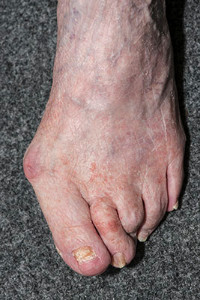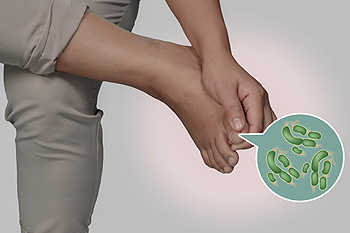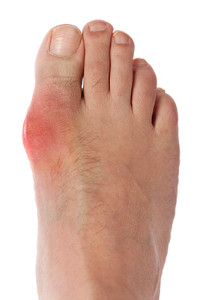
Drexel Hill (484) 521-0233
West Chester (610) 436-5883

Drexel Hill (484) 521-0233
West Chester (610) 436-5883
 A common ailment many women complain of during pregnancy is swollen feet. It generally occurs during the third trimester as a result of fluid retention and typically collects in the feet and ankles. It’s important to be aware of excessive swelling, as it may be an indication of a possible blood clot. If the feet become reddened or pain is noticed while pointing and flexing the foot, serious health issues may be present. Possible causes may include ingesting foods laden with excessive salt or lacking potassium in the diet. Additionally, a change in environment, such as extreme heat or consuming an overabundance of caffeine, may all be reasons why swollen feet occur. There are several ways to treat and prevent this condition, including resting the feet as much as possible. Exercising regularly is often recommended for treating swollen feet, in addition to drinking plenty of water.
A common ailment many women complain of during pregnancy is swollen feet. It generally occurs during the third trimester as a result of fluid retention and typically collects in the feet and ankles. It’s important to be aware of excessive swelling, as it may be an indication of a possible blood clot. If the feet become reddened or pain is noticed while pointing and flexing the foot, serious health issues may be present. Possible causes may include ingesting foods laden with excessive salt or lacking potassium in the diet. Additionally, a change in environment, such as extreme heat or consuming an overabundance of caffeine, may all be reasons why swollen feet occur. There are several ways to treat and prevent this condition, including resting the feet as much as possible. Exercising regularly is often recommended for treating swollen feet, in addition to drinking plenty of water.
Pregnant women with swollen feet can be treated with a variety of different methods that are readily available. For more information about other cures for swollen feet during pregnancy, consult with the podiatrists from Dr. Siegerman & Associates. Our doctors will attend to all of your foot and ankle needs.
What Foot Problems Can Arise During Pregnancy?
One problem that can occur is overpronation, which occurs when the arch of the foot flattens and tends to roll inward. This can cause pain and discomfort in your heels while you’re walking or even just standing up, trying to support your baby.
Another problem is edema, or swelling in the extremities. This often affects the feet during pregnancy but tends to occur in the later stages.
How Can I Keep My Feet Healthy During Pregnancy?
If you have any questions please feel free to contact one of our offices located in Drexel Hill and West Chester, PA . We offer the newest diagnostic and treatment technologies for all your foot and ankle needs.
Read more about Pregnancy and Foot Health When a toenail cuts into the side of the toe, it is often referred to as an ingrown toenail. Common causes for this condition may be shoes that are not fitting properly and toenails being trimmed incorrectly. Wearing shoes with pointed toes or high heels may cause the toes to have limited room to move freely, resulting in the nails burrowing into the side of the toe. General symptoms may include pain around the toe, and the skin becomes red and swollen. Drainage from the area may indicate an infection, which may require taking an antibiotic for treatment. It may be beneficial to avoid wearing shoes that fit tightly, and sandals with an open toe are recommended until the nail is healed. Prevention of this condition may include properly cutting the toenails, which ideally is performed straight across, and keeping the feet dry and clean.
When a toenail cuts into the side of the toe, it is often referred to as an ingrown toenail. Common causes for this condition may be shoes that are not fitting properly and toenails being trimmed incorrectly. Wearing shoes with pointed toes or high heels may cause the toes to have limited room to move freely, resulting in the nails burrowing into the side of the toe. General symptoms may include pain around the toe, and the skin becomes red and swollen. Drainage from the area may indicate an infection, which may require taking an antibiotic for treatment. It may be beneficial to avoid wearing shoes that fit tightly, and sandals with an open toe are recommended until the nail is healed. Prevention of this condition may include properly cutting the toenails, which ideally is performed straight across, and keeping the feet dry and clean.
Ingrown toenails can become painful if they are not treated properly. For more information about ingrown toenails, contact the podiatrists of Dr. Siegerman & Associates. Our doctors can provide the care you need to keep you pain-free and on your feet.
Ingrown Toenails
Ingrown toenails occur when a toenail grows sideways into the bed of the nail, causing pain, swelling, and possibly infection.
Causes
Prevention
Because ingrown toenails are not something found outside of shoe-wearing cultures, going barefoot as often as possible will decrease the likeliness of developing ingrown toenails. Wearing proper fitting shoes and using proper cutting techniques will also help decrease your risk of developing ingrown toenails.
Treatment
Ingrown toenails are a very treatable foot condition. In minor cases, soaking the affected area in salt or antibacterial soaps will not only help with the ingrown nail itself, but also help prevent any infections from occurring. In more severe cases, surgery is an option. In either case, speaking to your podiatrist about this condition will help you get a better understanding of specific treatment options that are right for you.
If you have any questions please feel free to contact one of our offices located in Drexel Hill and West Chester, PA . We offer the newest diagnostic and treatment technologies for all your foot and ankle needs.
Read more about Ingrown Toenail Care A large piece of bone protruding on the top or side of the foot may be referred to as a bunion. It’s often the result of inflammation of the tissues surrounding the big toe, in addition to the bones and tendons not lining up correctly. Narrow and high-heeled shoes are a common cause of bunions, which may become larger as time progresses and can possibly cause conditions like bursitis and arthritis. Symptoms can include tingling or numbness of the big toe, nerve irritation, and severe pain. Common bunions typically don’t require an exam, and most will be managed by applying cold therapy, wearing shoes with cushioned pads, and possibly taking anti-inflammatory medications. Surgery may be an option to consider if the pain is persistent or is affecting the quality of your life. A consultation with a podiatrist is advised for treatment of this condition.
A large piece of bone protruding on the top or side of the foot may be referred to as a bunion. It’s often the result of inflammation of the tissues surrounding the big toe, in addition to the bones and tendons not lining up correctly. Narrow and high-heeled shoes are a common cause of bunions, which may become larger as time progresses and can possibly cause conditions like bursitis and arthritis. Symptoms can include tingling or numbness of the big toe, nerve irritation, and severe pain. Common bunions typically don’t require an exam, and most will be managed by applying cold therapy, wearing shoes with cushioned pads, and possibly taking anti-inflammatory medications. Surgery may be an option to consider if the pain is persistent or is affecting the quality of your life. A consultation with a podiatrist is advised for treatment of this condition.
If you are suffering from bunions, contact the podiatrists of Dr. Siegerman & Associates. Our doctors can provide the care you need to keep you pain-free and on your feet.
What Is a Bunion?
A bunion is formed of swollen tissue or an enlargement of boney growth, usually located at the base joint of the toe that connects to the foot. The swelling occurs due to the bones in the big toe shifting inward, which impacts the other toes of the foot. This causes the area around the base of the big toe to become inflamed and painful.
Why Do Bunions Form?
Genetics – Susceptibility to bunions are often hereditary
Stress on the feet – Poorly fitted and uncomfortable footwear that places stress on feet, such as heels, can worsen existing bunions
How Are Bunions Diagnosed?
Doctors often perform two tests – blood tests and x-rays – when trying to diagnose bunions, especially in the early stages of development. Blood tests help determine if the foot pain is being caused by something else, such as arthritis, while x-rays provide a clear picture of your bone structure to your doctor.
How Are Bunions Treated?
If you have any questions, please feel free to contact one of our offices located in Drexel Hill and West Chester, PA . We offer the newest diagnostic and treatment technologies for all your foot care needs.
 Many people get athlete’s foot, including children. Your child may complain of itching on the feet or may possibly experience a burning sensation. Occasionally there may be redness or an unpleasant odor that may develop from in between the toes. These may all be symptoms of athlete's foot, an uncomfortable fungal infection that typically develops within the feet and can possibly travel to other parts of the body if left untreated. It’s recommended for you and your child to consult with a podiatrist, who may test for the fungus by taking a small skin sample of the affected area. Treatment often consists of applying a powder or cream which may contain medicine to kill the fungus, enabling the foot to feel better quickly. Additionally, making sure your child does not wear shoes as often as possible and keeping the feet dry is important in keeping the fungus from growing. Prevention of this condition may include putting antifungal powder in your child’s footwear and drying the feet thoroughly, especially in between the toes.
Many people get athlete’s foot, including children. Your child may complain of itching on the feet or may possibly experience a burning sensation. Occasionally there may be redness or an unpleasant odor that may develop from in between the toes. These may all be symptoms of athlete's foot, an uncomfortable fungal infection that typically develops within the feet and can possibly travel to other parts of the body if left untreated. It’s recommended for you and your child to consult with a podiatrist, who may test for the fungus by taking a small skin sample of the affected area. Treatment often consists of applying a powder or cream which may contain medicine to kill the fungus, enabling the foot to feel better quickly. Additionally, making sure your child does not wear shoes as often as possible and keeping the feet dry is important in keeping the fungus from growing. Prevention of this condition may include putting antifungal powder in your child’s footwear and drying the feet thoroughly, especially in between the toes.
Athlete’s foot is an inconvenient condition that can be easily reduced with the proper treatment. If you have any concerns about your feet and ankles, contact the podiatrists from Dr. Siegerman & Associates. Our doctors will treat your foot and ankle needs.
Athlete’s Foot: The Sole Story
Athlete's foot, also known as tinea pedis, can be an extremely contagious foot infection. It is commonly contracted in public changing areas and bathrooms, dormitory style living quarters, around locker rooms and public swimming pools, or anywhere your feet often come into contact with other people.
Solutions to Combat Athlete’s Foot
Athlete’s foot can cause many irritating symptoms such as dry and flaking skin, itching, and redness. Some more severe symptoms can include bleeding and cracked skin, intense itching and burning, and even pain when walking. In the worst cases, Athlete’s foot can cause blistering as well. Speak to your podiatrist for a better understanding of the different causes of Athlete’s foot, as well as help in determining which treatment options are best for you.
If you have any questions please feel free to contact one of our offices located in Drexel Hill and West Chester, PA . We offer the newest diagnostic and treatment technologies for all your foot and ankle needs.
Read more about Athlete's Foot Painful attacks in the joints of the foot, especially the big toe, may be indicative of a condition referred to as gout. When an excess of uric acid builds up in the body, it can typically form into crystals; this can inflame the joints, possibly causing severe pain and swelling. Long-term arthritis is common if the cartilage is damaged due to a build up of crystals. Most sufferers of gout can find relief in lifestyle changes, including a healthy diet and exercise. Lowering the amount of uric acid in the body is an effective way in treating gout and can possibly be achieved by drinking plenty of water and limiting alcohol. Additionally, avoiding red meat and consuming a diet rich in vitamin C may also be helpful in eliminating crystals from the kidneys. If you experience pain in the big toe and foot, a consultation with a podiatrist is advised.
Painful attacks in the joints of the foot, especially the big toe, may be indicative of a condition referred to as gout. When an excess of uric acid builds up in the body, it can typically form into crystals; this can inflame the joints, possibly causing severe pain and swelling. Long-term arthritis is common if the cartilage is damaged due to a build up of crystals. Most sufferers of gout can find relief in lifestyle changes, including a healthy diet and exercise. Lowering the amount of uric acid in the body is an effective way in treating gout and can possibly be achieved by drinking plenty of water and limiting alcohol. Additionally, avoiding red meat and consuming a diet rich in vitamin C may also be helpful in eliminating crystals from the kidneys. If you experience pain in the big toe and foot, a consultation with a podiatrist is advised.
Gout is a foot condition that requires certain treatment and care. If you are seeking treatment, contact the podiatrists from Dr. Siegerman & Associates. Our doctors will treat your foot and ankle needs.
What Is Gout?
Gout is a type of arthritis caused by a buildup of uric acid in the bloodstream. It often develops in the foot, especially the big toe area, although it can manifest in other parts of the body as well. Gout can make walking and standing very painful and is especially common in diabetics and the obese.
People typically get gout because of a poor diet. Genetic predisposition is also a factor. The children of parents who have had gout frequently have a chance of developing it themselves.
Gout can easily be identified by redness and inflammation of the big toe and the surrounding areas of the foot. Other symptoms include extreme fatigue, joint pain, and running high fevers. Sometimes corticosteroid drugs can be prescribed to treat gout, but the best way to combat this disease is to get more exercise and eat a better diet.
If you have any questions please feel free to contact one of our offices located in Drexel Hill and West Chester, PA . We offer the newest diagnostic and treatment technologies for all your foot and ankle needs.
Read more about Everything You Need to Know About GoutRequest a free copy of
Laser Away Foot Pain!
today.
